From Claire—Several readers have written to say they’d be glad for occasional relief from our reports of tyranny, war, pestilence, and famine. Must every newsletter be depressing?
No, certainly not. Quite right you are. The Cosmopolitan Globalists are immensely grateful for world’s wonders and delights, and from now on, Sundays at the Cosmopolitan Globalist will be devoted to accounts of them.
If you’ve been reading this newsletter for a long time—before it became the Cosmopolitan Globalist—you’ll recall that right before the pandemic erupted in Europe, I flew to Mauritania to visit my family. I promised to report back, but I never did, because when I returned, the world was facing a calamity. France went into its first lockdown on my return. I devoted myself, in vain, to imploring my fellow Americans to go home and stay home.
Here is the report from Mauritania that I promised you.
There were plants and birds and rocks and things
We stopped one day for lunch at Matmata, a towering rock promontory far above a small, still lake the color of antique jade. The shaded grove of acacia trees where we took lunch was as lovely a place for a picnic as mankind has known, but that’s not the point. The point is that the lake is filled with crocodiles. And no one knows how they got there.
No, I can’t tell you anything else about the crocodiles. Seriously. You think I’m going to go down to take a closer look? You think anyone is? No, no one knows how they got there. You ask the Moors, “How did they get there?” And the answer is, “We don’t know. You think we’re going to go down to take a closer look?”
Our Moorish guides—or our new best friends, as I came to think of them, for hiking together for ten days is inescapably intimate, and you can’t help but become attached—cooked for us, and a good thing, because I wouldn’t have had the first clue how to feed myself in the desert. They were inventive given that we had to take everything we drank and ate with us, either on the back of the 4x4 or the camels. The nomads often live on nothing but goat meat, camel’s milk, beans, and dates. I asked Yahya, “Where do they get their Vitamin C?”
“We don’t really worry about things like ‘calories’ and ‘vitamins’ the way you guys do. Trust me, you can live on it.”
I did trust him, because, obviously, you can. I saw no evidence of malnutrition or ill-health. I understand there’s acute food insecurity among Malian refugees in the Mbera camp in the southeast, but that’s different. There’s little medical care, so I don’t know why everyone looked so healthy. Perhaps it’s because life is so challenging that the unhealthy don’t survive to adulthood? Perhaps it’s because the desert is clean.
People were happy, too. I didn’t meet many of them. Mauritania is the emptiest place I’ve ever been to, by far. But the difference between the Sahara and Paris was striking. No one will believe me if I say, “Mauritanian nomads are happier than Westerners.” They’ll think I’m romancing wretchedness, that I’m on a perverse orientalist vision-quest to venerate the noble savage. They’re right to be suspicious. On the face of it, it seems implausible. The country only recently abolished slavery, and by most accounts still practices it. It ranks at the bottom of every human development index. Few Mauritanians have more than a primary education; most are still living exactly as they have for the past ten thousand years. It isn’t a “developing” country, it’s a completely primitive society: There’s no art, no architecture, no decorative arts, no written literature.
People asked us not to take their photos for fear we’d steal their souls. Or something like that. We never did get a straight story about why Mauritanians don’t like having their photos taken. Is it based in the Islamic prohibition on reproducing the human form, as Leo suspected? Does it strike them as an indignity, as Ali Sheikh told me, to be treated as a tourist attraction or a zoo animal? Do they reject the immodesty, as Yahya said, of thinking oneself worthy of being photographed? Whatever the case, we met people who had never before touched an iPhone. In showing it to them, we made uneasy Apple-in-the-Garden-of-Eden jokes.
But there is a rich tradition of Hassaniya oral poetry, or so they told me—and one to which the people are so attached, Ali Sheikh said, that it accounts for Mauritania’s lack of doctors and engineers. Men can’t be persuaded to study practical things if they go to college: All they want to study is poetry. Poetry, love, the desert, and camels; poems about camels, the desert, and love—this is what Mauritanians are about. When men went to Nouakchott to make their fortune, their idea of “a fortune” was just enough money to go back to the desert, but this time with a big herd of camels and a donkey, so better to raise a passel of children and recite poetry. The poetry, apparently, is quite inventive. It has to be, Yahya told me—he tried to explain the complex metrical form; I gathered it was a bit like dactylic hexameter—because women choose their husbands on the basis of their suitors’ poetic wit.
“They choose their husbands?” I asked.
“Yes, absolutely.”
“And husbands are not allowed to take a second wife without the first’s permission,” Ali Sheikh added. (I later confirmed this was so. It’s in the Mauritanian legal code.)
“But why would a woman ever give her husband permission to do that?” I asked.
He explained it to me this way, in French: “In this country, there’s no insurance. There are no retirement funds. If you don’t have children, no one will take care of you when you’re old. So if you can’t have children, or enough children, you might ask your husband to get married again and have children, because then they would have to take care of you.”
I found this a plausible answer. I don’t know if it’s true. But judging from what I saw, Mauritanian men are chivalrous to women and tender with children. So perhaps it’s the honest answer. The literature describes Mauritania as “matriarchal” and suggests it’s quite different from other Islamic countries in the degree to which women boss men about. I didn’t see enough to know, but we tried bossing the men about, and they were awfully good-natured about it.
There’s no doubt in my mind, actually, and I submit there would be no doubt in the mind of any person with a reasonable sensitivity to human emotions, that Mauritanians in the desert are happier than Parisians. Note how I’m narrowing this down: Mauritanians in the desert are happier. It’s not true of Mauritanians in Nouakchott. (Yahya told me the only thing he wants to do in Nouakchott is watch Louis CK and get back to the desert as fast as possible.)
Body language varies from culture to culture and can sometimes be hard to read, but this wasn’t hard to read. Nomads in the desert are happy. Suicide is unknown in Mauritania. Yahya was shocked by the very question. Drug addiction is also unknown. The way they’ve secured the country from terrorists and smugglers may have something to do with that. Perhaps a lot. I’m not sure what other index you could look at to prove that Mauritanians are happier, but I don’t think it matters. You can see it.
It’s the lifestyle. The desert lifestyle is conducive to mental health. A Western lifestyle isn’t. I’m not romancing poverty here; I’m not saying this about life in the slums of Nouakchott. On returning from Mauritania, I noticed it, though. At least half of Paris is suffering acute mental torment. You can see it on everyone’s faces. The demands of modern life are no longer merely a source of discontent and neurosis, as Freud observed, but of outright insanity—the kind that makes you think you’re a unicorn, so you should cut off your ears and have a horn implanted in your forehead; the kind that makes you think it would be fun to shoot up a FedEx.
I’m not partial to evolutionary just-so stories that explain every mysterious aspect of human behavior as “advantageous to our ancestors in Africa,” but the element of truth in that story did strike me acutely. I spent ten days with no news of the rest of the world, in a tribe, basically. The Moors—all men—had a job to do, as a team: protect the women and children and provide us with food and shelter. They loved their job and took it very seriously. They did it well. My job, I suppose, was to admire, respect, and find them manly for doing it well. I was good at my job, too. We were outdoors all day and all night. We never slept inside. Our circadian rhythms were regulated by natural light. We moved all day, sometimes covering ten miles on foot, and we were exhausted at night. We slept deeply until the sun came up.
The Moors were fiercely protective of us. One night, as we all stretched out drowsily before the fire, hypnotized by the flames, full from dinner, slumberous from our exertions and lulled by the night sky, a strange thing happened. The Moors—who like us had seemed half-somnolent, full-bellied, in the twilight world between the rise of Venus and sleep—suddenly leapt up. It happened so quickly that all I sensed was the alarm. My first thought was that someone must be ambushing us; my second was that this made no sense, because we were the last human beings left in the world—we would have heard it miles away if there were others in the desert—all of these thoughts happened pre-verbally, it was all over before I could formulate anything but images in my mind, but I knew the men were suddenly not at all drowsy and in fact ready for war. It astonished me. They leapt up as if shocked by a current, all together, and then I heard something violent—like a car door slamming over and over. I managed to say something forgettable, like, “What the hell?” It took the rest of us more time to register that something odd had happened than it did for them to kill the viper, which I most certainly would never have noticed.
It was over before I had the chance to be alarmed, but I realized afterward that it had been approaching my sleeping bag. I was the one it would have bitten. I like to think that had I seen it, and had I known it was a poisonous snake (as opposed to a harmless snake, or a branch, or my own underwear), I would have done what they did—I would have decapitated it with the first rock I found. But frankly, I don’t think I would have. My instinct would have been to run, screaming. I hope I would have remembered to grab the child on the way, but honestly, I have no idea if I’d have had that much self-possession.
Our group bonded. The day consisted of solving manageable but challenging practical problems together, like getting the 4x4 through a tricky sand dune or treating an ailing camel. At night, they built a fire; we sat around the flames; they baked bread in the hot sand. As I fell asleep, I watched the stars come up. I became familiar with all of the constellations and their movements—we were in the Tropic of Cancer and the night sky was strange. I woke up when the sun rose. It felt right. I can’t put it any other way. We know, instinctively, how to live like this: This was the Original Design, and everything we’ve added since has just made things too complicated for us to handle.
I’m not saying we ought to return to this. We can’t. We shouldn’t. Civilization represents what is most extraordinary about humanity. Unlike the camels, we can live differently; we’re not obliged to live in the Original Design, we have strange, inexplicable talents—for mathematics, for building cities and the Internet, for building hospitals and the Hagia Sophia—and of course we should use these talents. But the Original Design feels right, comfortable, like a pair of shoes that fits perfectly. Civilization is high heels that pinch, shoes in which you can never quite get your balance.
As the week progressed, my attention returned. In the afternoons, when it was too hot to walk, we made camp under the acacia trees and napped, or chatted, or read. About six days in, I began reading a novel. I would never have read it, or even heard of it, otherwise. I realized that I hadn’t read a novel that way in years: I was completely sucked into the world the author created. I can’t do it anymore. I’m too distracted. In the desert, I couldn’t put it down. I kept turning the pages—even on the flight back to Paris. But it’s still sitting on my desk now, half-finished. The second I got back, I couldn’t read anymore. I had to go to the middle of the Sahara to get enough peace of mind to read a novel.
The Internet has done something devastating to our minds. I know that’s a trite observation, but feeling the way my attention come surging back made me realize this isn’t just a platitude. It made me realize I’m trapped, and we’re all trapped, in the Internet, and it’s making us deranged and miserable. It’s making us nuts.
But I have no idea how anyone could live in 2021 without it. We can no longer say, “Well, just turn it off!” Life outside the desert is far too intimately bound up in it; now, with the pandemic, life is the Internet. The Internet is all that exists. We are no longer allowed outside. Every experience we have, for the foreseeable future, will take place in our own apartments. On the Internet. The Internet is the world.
But it’s not a world that makes us happy. Only when it’s completely gone, for days, does the calm return, not just to read a book, but to talk and listen to another person, patiently. My relationships with other human beings, my tolerance for them, have been destroyed by the Internet. I don’t even have the patience for Zoom calls anymore. But in the desert I listened for hours to Leo as he babbled on about rockets and going to Mars.
I had long conversations with two of the Moors—with Yahya, in English, and Ali Sheik, in French. I would have loved to speak to Nagy, but he spoke only Hassaniya. We managed to communicate, though. Nagy was the Horowitz of the 4x4—the master of the sand dunes. When Nagy took the wheel, I was sure we wouldn’t have to shovel ourselves out of a sand dune. That became important to me. He had elegant, erect posture, and an astonishing ability to keep his clothes immaculate and crisply pressed in the middle of the Sahara.
We drove off-road through the desert, up into the mountains, past old colonial towns. I was puzzled by what the French had built in Moudjeria, in the middle of the desert. Mauritanians live in tents. The French for some reason built a red brick fortress, now crumbling, completely unlike anything else around them. “Why were their buildings so heavily fortified?” I asked, wondering who the French feared would cross the desert to attack their positions. “Who were they trying to defend themselves against?”
“Us,” said Yahya.
We camped at night near date palm trees, near the ancient ruins of Rachid. We stopped at the caravanserai in Tijikja; then crossed from the Adrar to the Tagant. We picnicked at the oasis in Timinit, then met our six camels and two camel drivers at Glaibe Ijechan, where we left the 4x4 and continued on foot and camel. Nagy drove the 4x4 back to Terjit. For the rest of the trip, we lived pretty much as nomads in the desert have always lived. We climbed mountains of rock and sand dunes. We walked through the White Valley, and found an oasis in which to swim. That was glorious.
Now—about the slavery. I don’t mean to minimize this. I just wasn’t in a position to learn much about it. I tried, but it was a touchier subject than I realized. I brought it up with the Moors as we drove down a long, empty stretch of desert road. I fell back on an old trick that’s always served me well as a conversationalist. Long ago I heard a speech about building rapport. The speaker, who used to be a friendless dweeb, explained that you could build rapport with absolutely anyone, no matter their culture or background, by using one simple trick: “You-me? Same-same!” He likes birds? What a coincidence—you’re an avid ornithologist! She likes cooking? Oh, wow! What a coincidence—you’ve been working on your sous vide.
That’s what was going through my head when I asked Ali Sheik about slavery. It was our first day on the road, and I figured it would be an icebreaker. “Say, I understand your country used to practice chattel slavery! That's such a coincidence, because mine did, too!”
Note. Do not use this question as a social icebreaker in Mauritania.
By the end of the trip, though, we were able to talk about it, at least a little bit. Yahya said to me, at last, “You know, maybe it would be better if we were a little more like the Americans. We never talk about it. We probably should. Maybe it would be healthier if we talked about it.” He paused. I nodded sensitively. “A little bit, I mean. Not like Americans, though—do you ever talk about anything else?”
I flirted with Yahya. He had taught himself fluent, idiomatic English from television. His English was easily as good as my French. He had been orphaned when he was only a year old, he told me. His parents had been killed in a car accident. He’d been raised by his extended family, in absolute poverty. He had only a primary school education. When he was twelve, he set out for Nouakchott, on his own, and learned how to repair cars in a mechanics’ shop. This was when al-Jazeera began streaming American movies with subtitles into the country. He taught himself English from them.
He had been, he told me one evening, a disturbed young man—full of crazy, even criminal impulses. But then, at the age of twenty, he read a book that changed his entire life. “It was Providence,” he said. “It cannot have been just a coincidence that I found this book.”
“What was the book?” We were speaking, just the two of us, by the fireside. It was one of the only chances we had to speak without supervision. Usually, the others were too close.
“It was by Des Conneries.”
I furrowed my brow. “Who?”
“It was called How to Win Friends and Influence People.”
“ … Dale Carnegie!”
“Yes! You’ve read it?”
“You’re kidding me. How did Dale Carnegie change your life?”
“He taught me that I could either be sorry for myself or be grateful for what I had. He taught me that other people are just like me—they all like a compliment.”
The astonishing thing was that yes, in his every interaction, he behaved as Dale Carnegie would have advised. He had superb social skills. He managed to make everyone feel at ease. He had risen from having absolutely nothing, a Mauritanian orphan, to being one of the most trusted desert guides in Mauritania, a well-regarded fixer for foreign journalists, a translator to the embassies and NGOs. A successful guy with a great life. Dale Carnegie had saved him.
Please, the Moors asked me, when I write about Mauritania, tell people it’s safe.
It is. I checked it out for myself. Not only is it safe from terrorists, it’s been largely safe from the pandemic. Mauritania dealt more successfully with Covid—by far—than the United States.1 Or any European country.
After I left, Leo came down with a cold. As kids do. His mom began imagining that she, too, felt feverish. She followed the government’s advice and called the hotline you’re supposed to call if you think you may have been exposed or infected. Health officials were on their doorstep within hours with the swabs. They came back in person with the results by the end of the day. They were fine.
Of course, it’s much easier to do this if you have a population of four million people spread out over a country twice the size of France and almost entirely made up of arid, impassable desert. It’s also much easier to do in a country where no one has been infected. At that point, they’d had only five confirmed cases, and they’d run every one to the ground with contact tracing and isolation.
I don’t really know why Mauritania was spared the worst ravages of the pandemic. But I’d guess it’s related to its safety from terrorists. No tourist has been the victim of a terrorist attack in Mauritania in thirteen years, even as the rest of the region has descended into a hellscape. No terrorist attacks at all have been recorded on Mauritanian soil since December 2011.
Mauritania is safe because there is just no way, physically, to get through that desert. They patrol it with helicopters and on camel. You’ve got the Atlantic Ocean to the West, a desert the size of the entire United States to the East, and if you set foot anywhere near the borders without permission, God help you. There’s only one airport and only a handful of access points to the country. They’ve got police checkpoints up and down every road. There’s only one paved road. They know exactly who’s supposed to be on that road. If you’re not supposed to be on it but you are anyway, they shoot you.
So our guides were understandably vexed that Europeans kept issuing travel advisories and warning their citizens not to visit Mauritania. If you judge by the body count, tourists are a lot safer from terrorists in Mauritania than they are in France.
Even the travel advisories worked to Mauritania’s advantage, though, when the virus hit. When I was there, I was one of only about 200 tourists in the country. People are so afraid to travel to Mauritania that no one brought the virus in during that period during which, in other countries, it silently grew.
Mauritanians went into action against the virus long before Europe did. When I flew in—in mid-February—the airport officials, masked and gloved, had a detailed questionnaire for me and every other passenger about our travel history. They learned my entire itinerary. Their counter-jihadi strategy doubled as a contact-tracing scheme.
The CDC had trained the healthcare workers who visited my family. They were reassuring and kind. They refused to accept payment. Meanwhile, the US was unable to test its own population. “How is it possible,” my brother asked the doctors, “that Mauritania is so on top of this, while in the United States—the biggest superpower in the world—we can’t even figure out how to test the President?
They told him, modestly, that Africa just had more experience of epidemic disease.
It’s painful to think of the blow the pandemic represents to Mauritania’s tiny tourism industry. Our guides were so optimistic about Mauritania’s future, so sure tourism was poised to take off. The only obstacle, they said, was the widespread but inaccurate perception that Mauritania wasn’t safe. I was planning to fix that for them. Throughout the trip, I was writing an article in my mind about how beautiful the country was and how unfair, and mistaken, the perception that Mauritania wasn’t safe. I looked forward to sending business their way.
I asked Yahya whether Mauritanian women felt repressed by the country’s strict observance of Islamic law. He told me, in all seriousness, that Mauritanian women were more free than Western ones.
“More free?” I said dubiously. “They have no right to do anything their husband doesn’t allow them to do.”
“But you don’t understand how Mauritanian men love our women. There’s nothing we won’t do to make them happy. We do everything for them.”
“I see,” I said.
On the very last day, we had only one car left. We loaded it up. Leo asked Mischa if he could ride in the back of the pickup, with the luggage. He’d been begging to do this the whole trip. Usually my brother said no. It’s not safe. In the back seat with you, kiddo, and with a seat belt on. But we weren’t going far, and we were only going over sand, and besides, Nagy was driving. There was nothing to hit for miles. In an especially jolly and relaxed mood, my brother said, “Okay, go ahead.”
Leo was exhilarated.
“I’ll ride with you!” I knew Yahya would jump on, too.
The sun was dazzling; our mood relaxed. Yahya didn’t look at me. He was entirely focused on making sure Leo didn’t fall off the back of the truck. They can’t afford to lose a Western kid. Losing even one would destroy the Mauritanian tourism industry for another ten years. I felt a bit foolish—had I just imagined we’d been slyly flirting all along?
Then Nagy took a steep dune, and the ride became bumpy. Not that bumpy. Nagy knew exactly how fast he could go before posing a risk to the passengers in the back. Yahya instinctively—or so it seemed—held out his hand to me so I could stabilize myself. I took it. The ride became smooth again, but he didn’t let go, and neither did I. We rode, holding hands like that, for about a minute—defying my family and the Shariah, with Leo cheerfully oblivious.
And then we arrived. We hopped off. We all said goodbye, and he was gone.
—Paris, March 2020
As of today, Mauritania has had 18,121 cases of Covid-19 and 452 deaths. Roughly one in ten thousand Mauritanians have perished of the disease, compared to about one in 550 Americans.


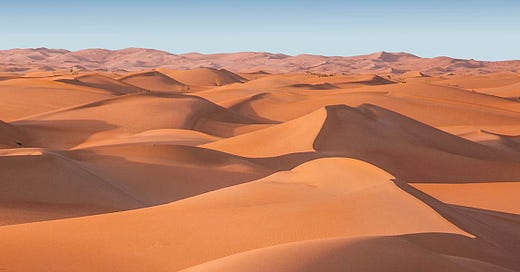



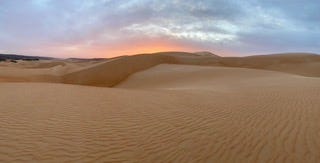
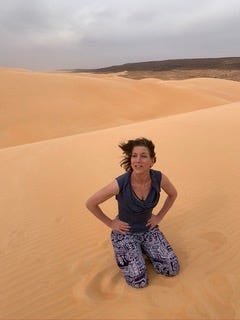
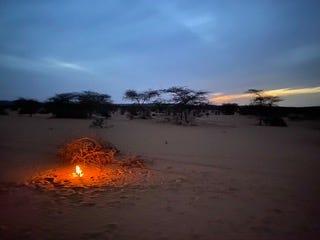
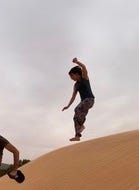
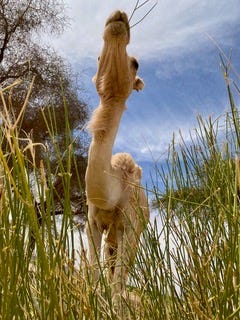
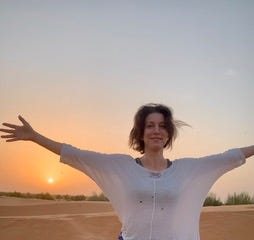
You make me want to go there.
A fantastic essay; just perfect for a Sunday afternoon!